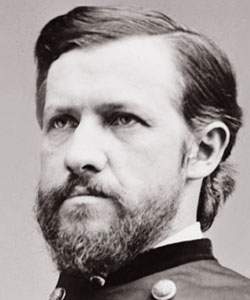Thomas Ewing (Congressional Biographical Directory)
Reference
EWING, Thomas, (son of Thomas Ewing [1789-1871]), a Representative from Ohio; born in Lancaster, Fairfield County, Ohio, August 7, 1829; pursued preparatory studies; private secretary to President Taylor in 1849 and 1850; was graduated from Brown University, Providence, R.I., in 1854; studied law; was admitted to the bar in 1855 and commenced practice in Cincinnati, Ohio; moved to Leavenworth, Kans., in 1856; member of the Leavenworth constitutional convention of 1858; delegate to the peace convention held in Washington, D.C., in 1861 in an effort to devise means to prevent the impending war; chief justice of the supreme court of Kansas in 1861 and 1862, when he resigned; recruited the Eleventh Regiment, Kansas Volunteer Cavalry, and was commissioned its colonel on September 15, 1862; brigadier general of Volunteers March 13, 1863; brevetted major general of Volunteers; practiced law in Washington, D.C., until 1871, when he returned to Lancaster, Ohio; member of the Ohio State constitutional convention in 1873 and 1874; elected as a Democrat to the Forty-fifth and Forty-sixth Congresses (March 4, 1877-March 3, 1881); declined to be a candidate for renomination in 1880; unsuccessful candidate for Governor of Ohio in 1879; moved to New York City in 1881, where he engaged in the practice of law until his death there on January 21, 1896; interment in Oakland Cemetery, Yonkers, N.Y.
“Ewing, Thomas,” Biographical Directory of the United States Congress, 1774 to Present, http://bioguide.congress.gov/scripts/biodisplay.pl?index=E000280.
Thomas Ewing (Congressional Biographical Directory)
Reference
EWING, Thomas, (father of Thomas Ewing [1829-1896]), a Senator from Ohio; born near West Liberty, Ohio County, Va. (now West Virginia), December 28, 1789; moved to Ohio with his parents in 1792; pursued preparatory studies; graduated from Ohio University at Athens in 1816; studied law; admitted to the bar in 1816 and commenced practice in Lancaster, Ohio; elected as an Anti-Jacksonian to the United States Senate and served from March 4, 1831, to March 3, 1837; unsuccessful candidate for reelection in 1836; chairman, Committee on Public Lands (Twenty-fourth Congress); appointed Secretary of the Treasury by President William Henry Harrison and served from March 5 to September 13, 1841; appointed Secretary of the Interior by President Zachary Taylor 1849-1850; appointed as a Whig to the United States Senate to fill the vacancy caused by the resignation of Thomas Corwin and served from July 20, 1850, to March 3, 1851; unsuccessful candidate for election to the United States Senate in 1851; resumed the practice of law in Lancaster; delegate to the peace convention held in Washington, D.C., in 1861 in an effort to devise means to prevent the impending war; appointed Secretary of War by President Andrew Johnson in February 1868, but the Senate refused to confirm the appointment; died in Lancaster, Ohio, October 26, 1871; interment in St. Mary’s Cemetery.
“Ewing, Thomas,” Biographical Directory of the United States Congress, 1774 to Present, http://bioguide.congress.gov/scripts/biodisplay.pl?index=E000281.
Thomas Ewing (American National Biography)
Scholarship
In November 1856 Ewing moved to Leavenworth, Kansas, and established his law practice. He also became heavily involved in land speculation in the new territory with his brother Hugh B. Ewing and also became actively involved in the Kansas Free State party. He took a strong stand against the Lecompton Constitution of 1857 and played a major role in uncovering fraud in an election for state officers through his canvass of ballot boxes in January 1858, thereby helping prevent Kansas's admission as a slave state. When admission as a free state finally came in January 1861, Ewing was elected as the new state's first chief justice of the supreme court.
William E. Parrish, "Ewing, Thomas, Jr.," American National Biography Online, February 2000, http://www.anb.org/articles/04/04-00355.html.





